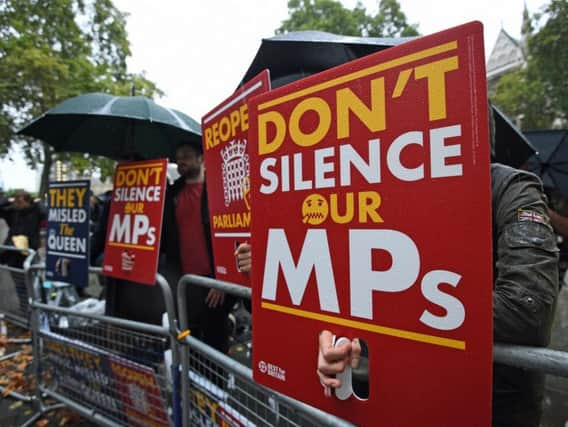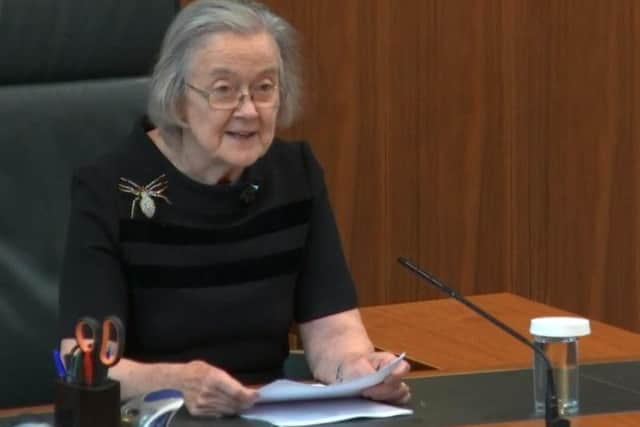Boris Johnson's advice to the Queen to suspend Parliament was unlawful, Supreme Court rules


In a huge blow to the Prime Minister, the court's Yorkshire-born President Baroness Hale Lady Hale said today that she and her fellow judges were "bound to conclude that the decision to advise Her Majesty to prorogue was unlawful because it had the effect of frustrating or preventing the ability of Parliament to carry out its constitutional functions."
She added that "a decision to prorogue, or advise the monarch to prorogue, will be unawful if the prorogation has the effect of frustrating or preventing without reasonable justification the ability of Parliament to carry out its constitutional functions as a legislature and as the body responsible for the supervision of the executive".
Advertisement
Hide AdAdvertisement
Hide AdA panel of 11 justices at the Supreme Court in London gave their decision this morning in a ruling on the legality of the Prime Minister's advice to the Queen to prorogue Parliament until October 14.
The judges, led by the court's president Lady Hale, heard appeals over three days arising out of legal challenges in England and Scotland - which produced different outcomes.
Lady Hale, who was born in Leeds and grew up in Richmond, North Yorkshire, said the prorogation was "void and of no effect", adding: "Parliament has not been prorogued." And she said the speakers of the Houses of Commons and Lords "can take immediate steps to enable each house to meet as soon as possible".


The Prime Minister advised the Queen on August 28 to prorogue Parliament for five weeks, and it was suspended on September 9 until October 14.
Advertisement
Hide AdAdvertisement
Hide AdMr Johnson says the five-week suspension is to allow the Government to set out a new legislative agenda in a Queen's Speech when MPs return to Parliament.
But those who brought legal challenges argue the prorogation is designed to prevent parliamentary scrutiny of the UK's impending exit from the EU on October 31.
The Supreme Court heard appeals over three days arising out of separate legal challenges in England and Scotland, in which leading judges reached different conclusions.


At the High Court in London, Lord Chief Justice Lord Burnett and two other judges rejected campaigner and businesswoman Gina Miller's challenge, finding that the prorogation was "purely political" and not a matter for the courts.
Advertisement
Hide AdAdvertisement
Hide AdBut in Scotland, a cross-party group of MPs and peers led by SNP MP Joanna Cherry QC won a ruling from the Inner House of the Court of Session that Mr Johnson's prorogation decision was unlawful because it was "motivated by the improper purpose of stymieing Parliament".
Mrs Miller has appealed against the decision of the High Court, asking the Supreme Court to find that the judges who heard her judicial review action "erred in law" in the findings they reached.
The justices have been asked to determine whether Mr Johnson's advice to the Queen was "justiciable" - capable of challenge in the courts - and, if so, whether it was lawful.
During last week's hearing, Lord Pannick QC, for Mrs Miller, told the packed court that Mr Johnson's motive for a five-week suspension was to "silence" Parliament, and that his decision was an "unlawful abuse of power".
Advertisement
Hide AdAdvertisement
Hide AdHe argued that Mr Johnson's reasons for advising on a suspension of that length "were improper in that they were infected with factors inconsistent with the concept of Parliamentary sovereignty".
But Sir James Eadie QC argued on the Prime Minister's behalf that the suggestion the prorogation was intended to "stymie" Parliament ahead of Brexit was "untenable".
Mr Johnson was asked whether he was nervous about the Supreme Court judgment in an interview in New York, and replied: "It takes a lot to make me nervous these days.
"All I can tell you is that I have the highest regard for the judiciary in this country, I will look at the ruling with care."
Advertisement
Hide AdAdvertisement
Hide AdHe was questioned by reporters on the flight to New York over whether he would resign if the Government lost.
"I will wait and see what the justices decide, the Supreme Court decides, because as I've said before I believe that the reasons for ... wanting a Queen's speech were very good indeed," he said.
